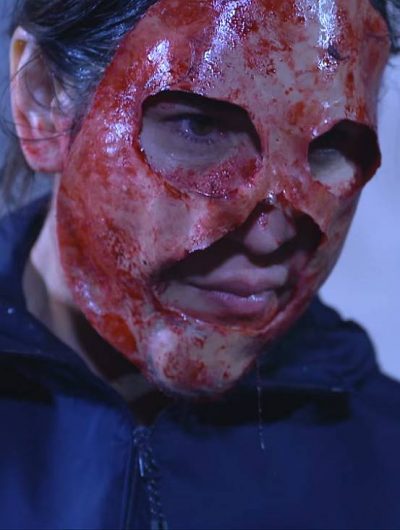★★★★
“The mother of all vengeance stories.”

 This is the first Thai TV series I’ve seen, and while I suspect it’s not exactly par for the course, I found it undeniably impressive. Behind a generic title, it’s easily the most intense of the telenovelas I’ve seen, regardless of location. [Note: various sources have different names for the characters: for consistency, I’m giving the ones used by Netflix] It’s a long, extended rampage of vengeance, in which the heroine, Maturos (Panyopas), goes after the perpetrators of a particularly vicious group-rape. The assailants are a local gang, who extract revenge on both Maturos and her daughter, Peung (Ruayruen), following their co-operation with the police. It’s an assault which leaves Matukron almost catatonic, and when half the gang are found not guilty in the subsequent trial, Maturos opts to find her own justice, adopting a variety of characters to get close to them. But the killing comes at the cost of her own sanity, which splits her personality into two: a caring and compassionate half, and an alternative persona which demands ever-more savage vengeance.
This is the first Thai TV series I’ve seen, and while I suspect it’s not exactly par for the course, I found it undeniably impressive. Behind a generic title, it’s easily the most intense of the telenovelas I’ve seen, regardless of location. [Note: various sources have different names for the characters: for consistency, I’m giving the ones used by Netflix] It’s a long, extended rampage of vengeance, in which the heroine, Maturos (Panyopas), goes after the perpetrators of a particularly vicious group-rape. The assailants are a local gang, who extract revenge on both Maturos and her daughter, Peung (Ruayruen), following their co-operation with the police. It’s an assault which leaves Matukron almost catatonic, and when half the gang are found not guilty in the subsequent trial, Maturos opts to find her own justice, adopting a variety of characters to get close to them. But the killing comes at the cost of her own sanity, which splits her personality into two: a caring and compassionate half, and an alternative persona which demands ever-more savage vengeance.
 The story is told in the context of Maturos’s trial, so we know there’s no question of her getting away with it [that would probably have been a step too far!]. But will she get the death penalty, life imprisonment, or be found not guilty by reason of insanity? The show unfolds in flashback, occasionally interrupted with moments from the trial, telling the story of how she came to be facing multiple charges of murder. It begins with mother and daughter leaving their abusive husband and father. It’s the resulting precarious financial situation, moving them into a flat in a less than desirable neighbourhood, and bringing them into contact with the gang. They accidentally come into possession of a drug stash belonging to the posse, and hand it over to the authorities.
The story is told in the context of Maturos’s trial, so we know there’s no question of her getting away with it [that would probably have been a step too far!]. But will she get the death penalty, life imprisonment, or be found not guilty by reason of insanity? The show unfolds in flashback, occasionally interrupted with moments from the trial, telling the story of how she came to be facing multiple charges of murder. It begins with mother and daughter leaving their abusive husband and father. It’s the resulting precarious financial situation, moving them into a flat in a less than desirable neighbourhood, and bringing them into contact with the gang. They accidentally come into possession of a drug stash belonging to the posse, and hand it over to the authorities.
This triggers the brutal punishment on them both, on top of a building during a storm. It’s a lengthy ordeal, which occupies much of episode #4, with Maturos and Peung left lying on the roof. Though the police are able to arrest the suspects, the rain washes away much useful forensic evidence; only three of the seven are convicted, despite the best efforts of Inspector Patorn (Tangtong). He feels responsible for what happened, and had been somewhat involved in a relationship with Maturos before the attack. Afterward, however, that quickly proves to be impossible.
Indeed, it’s not long before Maturos’s alter ego, Roong, starts to show up. At first, she is subservient, appearing only in mirrors, but gradually becomes to dominate, taking control for much of the time. Not helping matters – though it is one of the most interesting angles – is the encouragement of Yuki Fukushida (Amratisha), who rescues Maturos from an abduction attempt by her ex-husband. Yuki runs a “victim’s support group”, for those abandoned by justice. It’s really more to do with helping them acquire the necessary set of skills to punish those who did them wrong. Needless to say, her encouragement doesn’t do much for our heroine’s sanity, instead letting her tap into her inner psychopath. The ex-husband is the first to experience that.
For the four unconvicted perpetrators, the pattern in the following episodes is similar. As shown on the poster (above, right), Maturos adopts a range of disguises – old woman, porn distributor, bar girl, human trafficker, or even a man – in order to get close to them. Having done so, eventually, she strikes, rendering them helpless, most typically with a sedative injection. She makes them record an apology to Peung, before finally dispatching them – albeit only after removing their genitals. Their deaths are never quick or easy, and are depicted at quite some length, as well as with a brutality which I found surprising. Thai TV may have severe limitations on sexual content, but violence is clearly seen as much less of a problem.
As  the body count increases, the remaining gang members grow increasingly suspicious, and harder to track. Inspector Patorn is also beginning to put two and two together, and Maturos’s psychiatrist, Dr. Nattha, discovers her patient’s split personality, meeting Roong. Even after Patorn realizes her involvement in the murders, he agrees to let her act as bait to lure in the three remaining gang members, who have escaped from prison and, having reached the same conclusion, are coming for their own revenge.
the body count increases, the remaining gang members grow increasingly suspicious, and harder to track. Inspector Patorn is also beginning to put two and two together, and Maturos’s psychiatrist, Dr. Nattha, discovers her patient’s split personality, meeting Roong. Even after Patorn realizes her involvement in the murders, he agrees to let her act as bait to lure in the three remaining gang members, who have escaped from prison and, having reached the same conclusion, are coming for their own revenge.
But Maturos is playing a longer game, and it all builds to a final confrontation on the same rooftop where it began. As the image on the left suggests, she ends up going full Silence of the Lambs, wearing the face of one of her targets as a mask, and her final “disguise”. Though we still have to wait for the court’s verdict on her fate, with the case triggering a national debate regarding the death penalty, in addition to the question of Maturos’s culpability.
As on screen, so in real life, with the series proving a word of mouth hit in Thailand, and sparking similar discussions on the criminal justice system. The show’s ratings improved from as low as 1.3 in the early going, partly due to a late-night slot resulting from its content, reaching 3.7 for the finale. Deservedly so, because it was very effective: a real page-turner in televisual form. It certainly doesn’t pull any punches, and seems to be radically different from the typical “lakorn”, as the popular soap operas in Thailand are known. Though a 2014 study discovered that 80% of them depicted rape or sexual violence, I suspect few did so in such an uncompromising way as here.
It may, indeed, perhaps go too far occasionally. Chris largely lost her sympathy for Maturos, after watching her bring Peung along on one of her murders – even I have to admit, that is fairly questionable parenting, split personality or not. And watching the heroine don blackface in her prostitute character was perhaps something which didn’t transfer well, culturally. However, given the length of the series (24 x 50-minute episodes), such mis-steps are infrequent, and more than balanced out by a great performance from Panyopas. That’s especially so when she’s acting opposite her malevolent self, in a way which feels almost like a maternal version of Gollum.
It’s her portrayal which glues the series together; outside of sensei Yuki, the supporting cast of characters feel more functional than memorable, on both sides of the law. How successful you find the show as a whole is thus likely heavily dependent on how convincing you find her performance. Personally, I was more than satisfied with it, and while this may be optimistic, hope to find similar quality elsewhere in the lakorn genre.
Dir: Sant Srikaewlaw
Star: Lalita Panyopas, Pornsroung Ruayruen, Saksit Tangtong, Rudklao Amratisha
a.k.a. Lah (The Hunt)





 Despite a startling cover, this isn’t as sleazy as it seems. Indeed, even the title appears to be erring on the side of restraint, having apparently avoided the more obvious (and arguably, accurate) one of Killer Pussy. While the heroine certainly has an… interesting choice of costume, that’s as far as the film wants to go. It’s an odd approach: a sleeve like that sets up certain sets of expectations, which the movie has no apparent interest in matching. It’s not as if anyone of a sensitive nature is going to have got past the cover, so it seems odd to exercise such self-discipline when it comes to the content.
Despite a startling cover, this isn’t as sleazy as it seems. Indeed, even the title appears to be erring on the side of restraint, having apparently avoided the more obvious (and arguably, accurate) one of Killer Pussy. While the heroine certainly has an… interesting choice of costume, that’s as far as the film wants to go. It’s an odd approach: a sleeve like that sets up certain sets of expectations, which the movie has no apparent interest in matching. It’s not as if anyone of a sensitive nature is going to have got past the cover, so it seems odd to exercise such self-discipline when it comes to the content. I’ll confess, the headline above is a bit click-baity. This is perhaps closer to a female version of The Frighteners, the early Peter Jackson film in which Michael J. Fox could see dead people, and had to learn to work with them. The conduit in this case is Rika (Yanagi), a young woman who has been able to see ghosts since a young age. But an encounter with a trio of ghosts, all murder victims who are seeking revenge on their killers, opens a whole new realm. For, it turns out, whenever Rika is in a life-threatening situation, the spirits can take physical form. They can also draw energy from her, which can be used to create weapons, which range from the merely strange (the “meat hammer”) to the bat-shit insane. None more so there, than that of Akari (Mikado). She has a tendency to go into puppy mode when stressed, which involves her becoming… a bit licky. So inevitably her weapon transforms Akari’s hand into Grudge Dog, capable of ripping the face off her opponent.
I’ll confess, the headline above is a bit click-baity. This is perhaps closer to a female version of The Frighteners, the early Peter Jackson film in which Michael J. Fox could see dead people, and had to learn to work with them. The conduit in this case is Rika (Yanagi), a young woman who has been able to see ghosts since a young age. But an encounter with a trio of ghosts, all murder victims who are seeking revenge on their killers, opens a whole new realm. For, it turns out, whenever Rika is in a life-threatening situation, the spirits can take physical form. They can also draw energy from her, which can be used to create weapons, which range from the merely strange (the “meat hammer”) to the bat-shit insane. None more so there, than that of Akari (Mikado). She has a tendency to go into puppy mode when stressed, which involves her becoming… a bit licky. So inevitably her weapon transforms Akari’s hand into Grudge Dog, capable of ripping the face off her opponent. 2020’s first seal of approval goes to this uber-gritty Irish film, starring Sarah Bolger, whose most familiar to us from Into the Badlands. While her GWG creds there are overshadowed by the likes oE Emily Beecham, safe to say Bolger makes up for lost time here. She plays single mother Sarah Collins, who is struggling to come to terms with the recent, unsolved murder of her husband. Barely managing to make ends meet, her life is upended when entry-level criminal Tito (Simpson) breaks in, seeking sanctuary. He has stolen some drugs belonging to top boss Leo (Hogg), and offers Sarah a cut of the proceeds if she’ll act as his safe-house. Very reluctantly, she agrees. Needless to say, it doesn’t go as they plan.
2020’s first seal of approval goes to this uber-gritty Irish film, starring Sarah Bolger, whose most familiar to us from Into the Badlands. While her GWG creds there are overshadowed by the likes oE Emily Beecham, safe to say Bolger makes up for lost time here. She plays single mother Sarah Collins, who is struggling to come to terms with the recent, unsolved murder of her husband. Barely managing to make ends meet, her life is upended when entry-level criminal Tito (Simpson) breaks in, seeking sanctuary. He has stolen some drugs belonging to top boss Leo (Hogg), and offers Sarah a cut of the proceeds if she’ll act as his safe-house. Very reluctantly, she agrees. Needless to say, it doesn’t go as they plan. Coming in on a wave of hype, e.g. “The Best Indie Science Fiction Movie Since Moon“, I guess I should have listened – because I didn’t think Moon was
Coming in on a wave of hype, e.g. “The Best Indie Science Fiction Movie Since Moon“, I guess I should have listened – because I didn’t think Moon was  It’s one of those weird coincidences. I watched two action heroine flicks last weekend and both, while American, starred actresses who were born in Greece. Really, what are the odds?
It’s one of those weird coincidences. I watched two action heroine flicks last weekend and both, while American, starred actresses who were born in Greece. Really, what are the odds?  Kozue (Yokoyama) and her younger sister Akane (Momomiya) are driving through the countryside when their car breaks down, near a closed camp-ground. Closed – but, unfortunately for them, not deserted. The well-mannered young man whom they first encounter turns out to be a lure, who brings the two women into the grasp of a pack of psychopaths. The nicknames these weirdos have, largely sum up the extreme peril of the situation for the siblings: Hypo, Pyro, Copro, Necro and Thanatos. It turns out they were all pals during an enforced stay in a nearby mental hospital. When that shut down suddenly (in a way explained later on), they opted to hang around, forming some kind of sexually-deviant collective. Kozue and Akane pretty much represent a theme-park for these perverts.
Kozue (Yokoyama) and her younger sister Akane (Momomiya) are driving through the countryside when their car breaks down, near a closed camp-ground. Closed – but, unfortunately for them, not deserted. The well-mannered young man whom they first encounter turns out to be a lure, who brings the two women into the grasp of a pack of psychopaths. The nicknames these weirdos have, largely sum up the extreme peril of the situation for the siblings: Hypo, Pyro, Copro, Necro and Thanatos. It turns out they were all pals during an enforced stay in a nearby mental hospital. When that shut down suddenly (in a way explained later on), they opted to hang around, forming some kind of sexually-deviant collective. Kozue and Akane pretty much represent a theme-park for these perverts. I should probably start by providing some background the film omits – likely because the intended Indian audience were well aware of it. In 2012, a notorious gang-rape took place in Delhi, the victim subsequently dying. Of the six attackers, four were sentenced to death and one committed suicide in prison – but the sixth, being a juvenile, could only receive a maximum sentence of three years. This loophole appalled many, including two journalists depicted in this film, Jyothi (Nivedhitha) and Divya (Karagada), who begin a campaign to revise the law.
I should probably start by providing some background the film omits – likely because the intended Indian audience were well aware of it. In 2012, a notorious gang-rape took place in Delhi, the victim subsequently dying. Of the six attackers, four were sentenced to death and one committed suicide in prison – but the sixth, being a juvenile, could only receive a maximum sentence of three years. This loophole appalled many, including two journalists depicted in this film, Jyothi (Nivedhitha) and Divya (Karagada), who begin a campaign to revise the law. Despite a mangled title, what you have here is a straightforward tale of vengeance – and its attempts to diverge from that narrative are when the film is at its least interesting. Evil general Ji Xian Tang kills the parents of Ho Yu Fung (Ding): well, I suppose technically he only kills her father, her mother committing suicide by the corpse. In some remarkably unsubtle foreshadowing, Yu Fung is told, “This broadsword is our family heirloom. Our hope for vengeance is in your hands.” Given this, it’s no surprise she escapes with the help of a brave sacrifice from a servant, and becomes the pupil of a kung-fu master.
Despite a mangled title, what you have here is a straightforward tale of vengeance – and its attempts to diverge from that narrative are when the film is at its least interesting. Evil general Ji Xian Tang kills the parents of Ho Yu Fung (Ding): well, I suppose technically he only kills her father, her mother committing suicide by the corpse. In some remarkably unsubtle foreshadowing, Yu Fung is told, “This broadsword is our family heirloom. Our hope for vengeance is in your hands.” Given this, it’s no surprise she escapes with the help of a brave sacrifice from a servant, and becomes the pupil of a kung-fu master. Either by intent or accidentally – and we’ll get to that in a moment – this manages to be both an indictment of and an advert for, American gun culture. That’s quite a spectacular achievement, and it’s perhaps no coincidence that the writer/director is British, so brings an outsider’s balanced eye to a topic that’s often acrimonious in the States. Kathleen Sullivan (Young) is a teacher who has just moved from Boston to a small Texas town. She falls for local attorney Larry Keeler (Day), though is only interested in friendship, not a significant relationship. The initially-charming Larry eventually won’t take no for an answer, and date-rapes Kathleen. However, the circumstances and her attacker’s local reputation mean she gets no satisfaction from the police. The meek and mild Kathleen decides to take matters into her own hands, buying a gun and taking up combat shooting – at the very same club Larry frequents – with the aim of meting out her own brand of justice.
Either by intent or accidentally – and we’ll get to that in a moment – this manages to be both an indictment of and an advert for, American gun culture. That’s quite a spectacular achievement, and it’s perhaps no coincidence that the writer/director is British, so brings an outsider’s balanced eye to a topic that’s often acrimonious in the States. Kathleen Sullivan (Young) is a teacher who has just moved from Boston to a small Texas town. She falls for local attorney Larry Keeler (Day), though is only interested in friendship, not a significant relationship. The initially-charming Larry eventually won’t take no for an answer, and date-rapes Kathleen. However, the circumstances and her attacker’s local reputation mean she gets no satisfaction from the police. The meek and mild Kathleen decides to take matters into her own hands, buying a gun and taking up combat shooting – at the very same club Larry frequents – with the aim of meting out her own brand of justice.